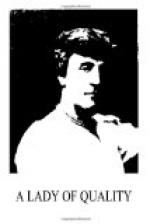The duchess rose, and stood up tall and great, her arms out-thrown.
“I think ’twas God Himself who did it,” she said, “though ’twas I who struck the blow. He drove me mad and blind, he tortured me, and thrust to my heart’s core. He taunted me with that vile thing Nature will not let women bear, and did it in my Gerald’s name, calling on him. And then I struck with my whip, knowing nothing, not seeing, only striking, like a goaded dying thing. He fell—he fell and lay there—and all was done!”
“But not with murderous thought—only through frenzy and a cruel chance—a cruel, cruel chance. And of your own will blood is not upon your hand,” Anne panted, and sank back upon her pillow.
“With deepest oaths I swear,” Clorinda said, and she spoke through her clenched teeth, “if I had not loved, if Gerald had not been my soul’s life and I his, I would have stood upright and laughed in his face at the devil’s threats. Should I have feared? You know me. Was there a thing on earth or in heaven or hell I feared until love rent me. ’Twould but have fired my blood, and made me mad with fury that dares all. ’Spread it abroad!’ I would have cried to him. ’Tell it to all the world, craven and outcast, whose vileness all men know, and see how I shall bear myself, and how I shall drive through the town with head erect. As I bore myself when I set the rose crown on my head, so shall I bear myself then. And you shall see what comes!’ This would I have said, and held to it, and gloried. But I knew love, and there was an anguish that I could not endure—that my Gerald should look at me with changed eyes, feeling that somewhat of his rightful meed was gone. And I was all distraught and conquered. Of ending his base life I never thought, never at my wildest, though I had thought to end my own; but when Fate struck the blow for me, then I swore that carrion should not taint my whole life through. It should not—should not—for ’twas Fate’s self had doomed me to my ruin. And there it lay until the night; for this I planned, that being of such great strength for a woman, I could bear his body in my arms to the farthest of that labyrinth of cellars I had commanded to be cut off from the rest and closed; and so I did when all were sleeping—but you, poor Anne—but you! And there I laid him, and there he lies to-day—an evil thing turned to a handful of dust.”
“It was not murder,” whispered Anne—“no, it was not.” She lifted to her sister’s gaze a quivering lip. “And yet once I had loved him—years I had loved him,” she said, whispering still. “And in a woman there is ever somewhat that the mother creature feels”—the hand which held her sister’s shook as with an ague, and her poor lip quivered—“Sister, I—saw him again!”
The duchess drew closer as she gasped, “Again!”
“I could not rest,” the poor voice said. “He had been so base, he was so beautiful, and so unworthy love—and he was dead,—none knowing, untouched by any hand that even pitied him that he was so base a thing, for that indeed is piteous when death comes and none can be repentant. And he lay so hard, so hard upon the stones.”




